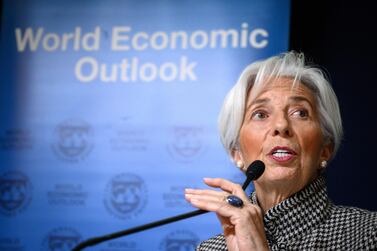Britain's Brexit-bound economy unexpectedly grew in February, helped by manufacturers rushing to meet orders from clients who are stockpiling goods ahead of the country's break from the European Union, official data showed.
While still sluggish, the economy expanded by 0.2 per cent from January, the Office for National Statistics said on Wednesday. Economists in a Reuters poll had expected zero growth.
Britain's economy has held up better than expected since the 2016 Brexit referendum although it has slowed since mid-2018 as the political impasse over the country's departure from the EU deepened and as the world economy lost momentum.
The International Monetary Fund said on Tuesday that Britain would grow by 1.2 per cent in 2019, if it can avoid the shock of a no-deal Brexit. That would be faster than Germany's 0.8 per cent and only a touch slower than France's 1.3 per cent.
But Britain still looks set for its weakest growth in a decade this year, even assuming a Brexit deal will be done, according to forecasts from the IMF and the Bank of England. Prime Minister Theresa May will ask EU leaders for a new delay to Brexit on Wednesday, just two days before Britain is due to leave the bloc without the cushion of a transition deal.
Wednesday's data showed that over the three months to February, gross domestic product grew by 0.3 per cent, holding at the same pace as in January - which was revised up slightly from a previous estimate - and stronger than a forecast of 0.2 per cent in the Reuters poll.
In annual terms, growth in February hit 2 per cent, the strongest pace since late 2017. Sterling briefly hit the day's high, rising 0.2 per cent to $1.3086 before falling back.
Samuel Tombs, an economist with Pantheon Macroeconomics, said the resilience of the data - combined with wages that are growing at their fastest pace in a decade - would put renewed pressure on the BoE to raise interest rates this year.
"We continue to think that the 20 per cent chance that investors are attaching to a rate hike this year is far too low and still expect the [BoE] to raise Bank Rate once before the end of this year," Mr Tombs said in a note to clients..
The ONS said it saw signs that clients of manufacturers were stockpiling goods to get ahead of any border delays after Brexit, which was originally scheduled for March 29. Manufacturing output jumped by 0.9 per cent in February from January, accounting for about half of the overall economic growth rate.
Economists have warned that a rise in orders before Brexit could lead to a pay-back of less demand later. The ONS said it could not quantify the impact of stockpiling on the data.
Britain's dominant services sector grew by 0.1 per cent in monthly terms in February, held back by the 12th fall in a row in the financial services sector - the longest such run on record - while construction rose by 0.4 per cent.
There were signs that the slowdown in the global economy was also weighing on Britain's economy. Export volumes fell by 0.4 per cent in the three months to February from the three months to November while imports jumped by 6.8 per cent.
So far, Britain's exporters have shown no sign of being helped by the fall in the value of the pound following the 2016 Brexit referendum.
The latest data comes as UK manufacturers and their counterparts across the European Union said they’re “woefully” unprepared for a no-deal Brexit, and called on the bloc to avoid Britain leaving without an agreement, according to Bloomberg.
“Neither the EU nor the UK are ready, and as a consequence European industry is also not adequately prepared, for this cliff-edge scenario,” manufacturing lobby groups MakeUK and Ceemet said on Wednesday in a letter to governments and EU chief Brexit negotiator Michel Barnier. In a separate statement, they said a lack of “coherent preparation” by governments left manufacturers “woefully unprepared” for a no-deal outcome.
The intervention comes as EU leaders meet in Brussels to discuss whether to grant Prime Minister Theresa May an extension to the UK’s membership. She’s seeking to push Brexit back to June 30 from the current deadline of Friday.







